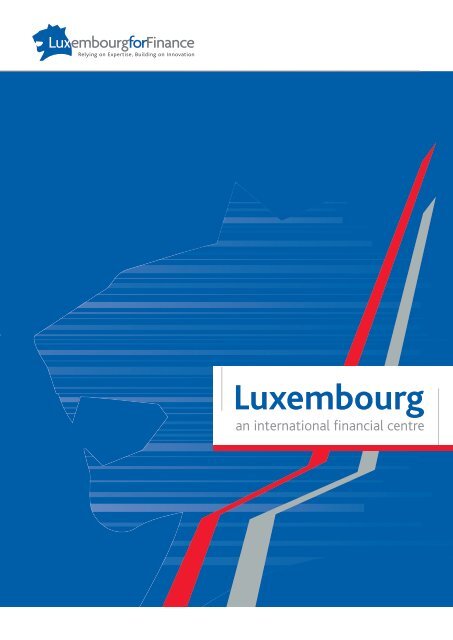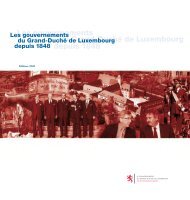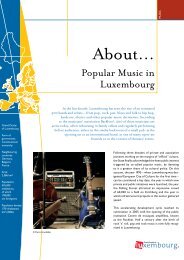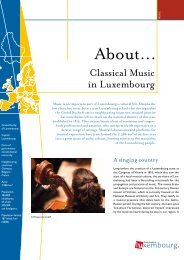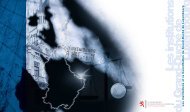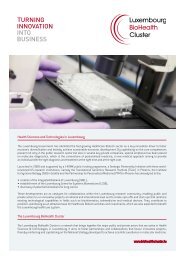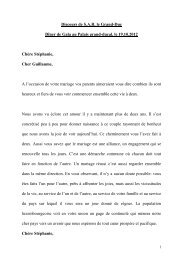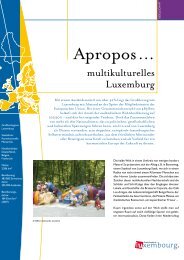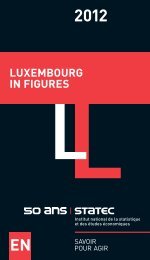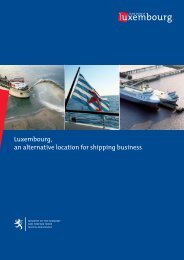English ( pdf, 3612 Kb ) - Luxembourg
English ( pdf, 3612 Kb ) - Luxembourg
English ( pdf, 3612 Kb ) - Luxembourg
Create successful ePaper yourself
Turn your PDF publications into a flip-book with our unique Google optimized e-Paper software.
<strong>Luxembourg</strong><br />
an international financial centre
LUXEMBOURG<br />
IN BRIEF<br />
Situated at the heart of Europe between<br />
Belgium, Germany and France, <strong>Luxembourg</strong><br />
is one of the smallest members of the<br />
European Union and the only Grand Duchy in<br />
the world. Independent since 1839,<br />
it is a constitutional monarchy governed<br />
by Prime Minister Jean-Claude Juncker.<br />
The head of state is Grand Duke Henri.<br />
With a territory of just 2,586 km 2 and<br />
a population of 512,000, the domestic<br />
market is inevitably limited. In consequence,<br />
<strong>Luxembourg</strong> has always sought to join<br />
larger economic groups and trade zones<br />
such as the German Zollverein, the Belgo-<br />
<strong>Luxembourg</strong> economic union and later<br />
Benelux.<br />
The <strong>Luxembourg</strong> village of Schengen, intersection point between <strong>Luxembourg</strong>,<br />
Germany and France, where the Schengen Accord was signed on 14 June 1985.<br />
This agreement progressively abolished frontier controls and permitted the free<br />
movement of people within the European Union.
2<br />
3<br />
A founding member of the European Union,<br />
<strong>Luxembourg</strong> is a member of all the principle<br />
international organisations.<br />
Its strategic location and openness towards<br />
the outside world, its political and social<br />
stability based on a culture of consensus,<br />
combined with a high quality of life, has<br />
attracted investors from around the world.<br />
These clients encounter supportive authorities<br />
and a qualified international workforce<br />
(43% of residents and 66% of the active<br />
population are foreigners). In addition to<br />
the three official languages, <strong>Luxembourg</strong>ish,<br />
French and German, <strong>English</strong> is spoken<br />
fluently throughout the business sector.<br />
The legal and regulatory framework is<br />
stable enough to be reliable and flexible<br />
enough to be adapted rapidly to an<br />
ever-changing environment.<br />
These factors, combined with an excellent<br />
logistical and communications infrastructure,<br />
make <strong>Luxembourg</strong> an ideal gateway<br />
to the European market and its 500 million<br />
consumers.<br />
<strong>Luxembourg</strong>, seat of the European Investment Bank, the Court of Justice<br />
of the European Union and the European Court of Auditors.<br />
© f.l.t.r.: EIB, Court of Justice of the European Union, European Court of Auditors
A DIVERSIFIED<br />
ECONOMY<br />
<strong>Luxembourg</strong> owes its economic<br />
expansion to the steel industry<br />
which dominated the economy of<br />
the country from the beginning of<br />
the 20 th century until the 1970s.<br />
Today, the capital hosts the seat of<br />
Arcelor-Mittal, the number one steel<br />
producer in the world.<br />
Just after the Second World War,<br />
international industrial groups such<br />
as Goodyear and DuPont de Nemours<br />
set up business in <strong>Luxembourg</strong>.<br />
The American company Guardian Luxguard, the European<br />
headquarters of which has been established in <strong>Luxembourg</strong><br />
since 1981, furnished 150,000 meters of double glazing for the<br />
construction of the highest tower in the world, the Burj Khalifa<br />
in Dubai.<br />
Furthermore, the “One World Trade Center”<br />
in New York City (the central tower of the<br />
new World Trade Center complex) will be<br />
constructed with steel beams produced at the<br />
Arcelor-Mittal factory in Differdange located<br />
in the south of <strong>Luxembourg</strong>.
4<br />
5<br />
Economic diversification spread rapidly to<br />
the service sector. Today, <strong>Luxembourg</strong> is<br />
an important media and communications<br />
centre, hosting the seat of RTL Group, the<br />
premier audiovisual group in Europe with<br />
45 television channels, 31 radio stations in<br />
11 countries, and SES Global, which, with a<br />
fleet of more than 40 satellites, is the largest<br />
satellite operator in the world.<br />
The Grand Duchy was also the first country<br />
to define a clear legal framework for electronic<br />
commerce, a fact which led world leaders<br />
such as Amazon, Paypal, eBay and Skype<br />
to centralise their European business in<br />
<strong>Luxembourg</strong>.<br />
Thanks to its integration in the trans-<br />
European road and rail network and its<br />
modern airport, <strong>Luxembourg</strong> is a strategic<br />
centre for logistical services. Cargolux is<br />
one of the largest air freight transporters<br />
in the world.<br />
The country has also set up a maritime flag<br />
that since 1991 has attracted a diversified<br />
fleet of merchant vessels.<br />
Finally, recent legislative initiatives were<br />
designed to create an optimal, specialised<br />
legal framework for the management of<br />
intellectual property and the development<br />
of research and development activities.<br />
LUXEMBOURG HAS THE HIGHEST LABOUR<br />
PRODUCTIVITY IN THE WORLD<br />
GDP per hour worked<br />
USA = 100<br />
<strong>Luxembourg</strong> 128.9<br />
Norway 127.7<br />
Ireland 104.9<br />
United States 100.0<br />
Belgium 98.4<br />
Netherlands 98.3<br />
France 95.0<br />
Germany 92.9<br />
G7 88.1<br />
Euro area 85.6<br />
Austria 83.8<br />
United Kingdom 82.9<br />
NAFTA* 82.9<br />
Switzerland 82.2<br />
Australia 81.9<br />
OECD-Europe ** 79.1<br />
Italy 76.0<br />
Canada 75.5<br />
Japan 66.6<br />
Russia 35.8<br />
* North American Free Trade Agreement<br />
** Excluding Turkey<br />
Source: OECD
THE FINANCIAL<br />
SECTOR<br />
The history of the <strong>Luxembourg</strong><br />
financial centre goes back to 1856,<br />
year of the creation of the Banque<br />
et Caisse d’Epargne de l’Etat and the<br />
Banque Internationale à <strong>Luxembourg</strong>.<br />
However, the evolution of <strong>Luxembourg</strong><br />
into an international financial<br />
centre only began a century later,<br />
when American, German and Swiss<br />
banks began to develop business in<br />
the Euromarket.<br />
The activities of the financial centre spread<br />
progressively wider, firstly to private banking<br />
and asset management and later to investment<br />
funds. A series of niche activities were<br />
added over the course of the last twenty<br />
years and today the <strong>Luxembourg</strong> financial<br />
centre is broadly diversified.<br />
This success is based first and foremost on<br />
a modern legal and regulatory framework<br />
which is particularly business friendly. As a<br />
Member State of the European Union, this<br />
framework is largely predefined by European<br />
Directives. However, since the national market<br />
is very limited, the legislator has used the<br />
margin for manoeuvre left by these directives<br />
to create an environment which supports<br />
the setting up of tailor made products and<br />
services for an international clientele.<br />
At the same time there is a strong culture<br />
of investor protection. Two supervisory<br />
authorities – the Commission de surveillance<br />
du secteur financier (CSSF) and the Commissariat<br />
aux assurances (CAA) – are in charge<br />
of the prudential supervision of financial and<br />
insurance activities respectively.
6<br />
7<br />
Today the <strong>Luxembourg</strong> financial<br />
centre is the largest investment<br />
fund centre in Europe - and<br />
second in the world after the<br />
ORIGIN OF BANKS ESTABLISHED<br />
IN LUXEMBOURG<br />
United States - the leading private<br />
banking centre in the Eurozone<br />
and the largest captive reinsurance<br />
centre in Europe.<br />
Germany<br />
France<br />
Belgium<br />
Switzerland<br />
11<br />
10<br />
14<br />
41<br />
Italy<br />
UK<br />
Sweden<br />
United States<br />
Japan<br />
8<br />
8<br />
7<br />
6<br />
5<br />
143 banks, subsidiaries or branches of<br />
major banking institutions from<br />
24 different countries, are established<br />
in <strong>Luxembourg</strong> and focus their activities<br />
on the international markets..<br />
In the financial services area, this multinational<br />
character of <strong>Luxembourg</strong> plays a particularly<br />
decisive role. Each bank, through its own market<br />
specificities and related expertise, contributes to<br />
the success of the financial centre.<br />
<strong>Luxembourg</strong><br />
China<br />
Netherlands<br />
Other<br />
countries<br />
4<br />
4<br />
5<br />
20<br />
0 5 10 15 20 25 30 35 40 45<br />
50<br />
Source: CSSF, March 2012
PRIVATE<br />
BANKING<br />
Private banking is a flagship activity<br />
of the <strong>Luxembourg</strong> financial centre.<br />
Services offered in this area vary<br />
from an advisory service, where the<br />
client takes his or her own investment<br />
decisions based on recommendations<br />
made by the relationship<br />
manager, to discretionary management,<br />
where it is the relationship<br />
manager who manages the assets of<br />
the client in line with that client’s<br />
risk profile and long term objectives.<br />
Banks, independent wealth managers and<br />
financial advisers can also develop tailor<br />
made solutions for an increasingly demanding<br />
clientele and expect highly qualified professional<br />
assistance, a personalised service<br />
and complete discretion.<br />
Investors benefit from the fact that wealth<br />
managers in <strong>Luxembourg</strong> are accustomed to<br />
serving an international clientele and have<br />
acquired extensive expertise in international<br />
financial engineering.<br />
For high net worth individuals, a number of<br />
banks apply a global approach to structuring<br />
a customer’s wealth over the longer term,<br />
incorporating financial and professional<br />
assets, life assurance and real estate, with<br />
a view to optimal long term asset planning<br />
and ultimate devolution.<br />
Wealth protection and succession planning<br />
are largely based on the creation of specific<br />
wealth management vehicles and on fiduciary<br />
operations.
8<br />
9<br />
The family wealth management company<br />
(société de gestion de patrimoine familial<br />
or SPF) provides individuals with a structure<br />
intended solely for the management of their<br />
private wealth. The exclusive objective of an<br />
SPF is the acquisition, holding, management<br />
and sale of financial assets. It is not allowed<br />
to undertake any commercial activity.<br />
The law does not require a family link<br />
between the various shareholders. The SPF<br />
is also open to wealth management entities,<br />
the exclusive purpose of which is to manage<br />
the wealth of private individuals, as well as<br />
to intermediaries holding shares in the SPF<br />
on a fiduciary basis or in a similar capacity,<br />
on behalf of investors who are themselves<br />
eligible.<br />
Designed as an investment company, the SPF<br />
must take the form of a capital company. It is<br />
a simple investment company, which is both<br />
flexible and complies with EU regulations.<br />
Since the activity of an SPF is not commercial<br />
but is close to that of an investment fund,<br />
it benefits from a subjective or personal tax<br />
exemption regime.<br />
CONFIDENTIALITY AND THE FIGHT<br />
AGAINST MONEY LAUNDERING<br />
Professional secrecy in the banking sphere is<br />
anchored in <strong>Luxembourg</strong> law in the same way as<br />
that of the medical professions. Its purpose is to<br />
protect the privacy of the client.<br />
Nevertheless, banking secrecy is not absolute:<br />
<strong>Luxembourg</strong> has fully adopted OECD standards in<br />
the area of the exchange of information on demand.<br />
As a member of the Financial Action Task Force<br />
(FATF), <strong>Luxembourg</strong> also applies very strict rules<br />
aimed at fighting money laundering and terrorist<br />
financing. The law imposes on all financial sector<br />
professionals the onus of verifying the identity of<br />
the client and the beneficial owner before establishing<br />
a business relationship or executing a transaction<br />
and of informing the competent authorities<br />
immediately of any suspect operation.<br />
In addition to the legal and regulatory constraints<br />
with which financial sector actors must comply, the<br />
associations and professional organisation of the<br />
financial centre have adopted ethical codes and<br />
codes of practice in which they define the professional<br />
standards to be applied by their members.
INVESTMENT<br />
FUNDS<br />
Collective investment management<br />
is a pillar of the <strong>Luxembourg</strong><br />
financial centre. A sector that has<br />
been developing since the mid<br />
1980s, <strong>Luxembourg</strong> is today by far<br />
the largest domicile in the world<br />
for undertakings for collective<br />
investment in transferable securities<br />
(UCITS). The UCITS label, which is<br />
granted to funds that comply with<br />
rules laid down in European directives<br />
on this subject, is recognised<br />
well beyond the frontiers of the<br />
European Community.<br />
The “European passport” granted to UCITS<br />
enables them to be sold cross-border into<br />
any EU Member State. Since <strong>Luxembourg</strong><br />
was the first country to offer this passport,<br />
most of the large asset management companies<br />
chose <strong>Luxembourg</strong> as the platform from<br />
which to distribute their investment funds<br />
worldwide.<br />
Whereas the European directives relating<br />
to undertakings for collective investment<br />
lay down the regulatory framework for<br />
UCITS, certain other types of investment<br />
fund do not fall within the scope of the<br />
European directives and are regulated by<br />
specific legislation.<br />
In <strong>Luxembourg</strong>, promoters can take advantage<br />
of a unique reservoir of product<br />
development experts, lawyers, accountants<br />
and service providers able to assist in the<br />
development, launch and distribution of<br />
their funds.
10<br />
11<br />
The legal and regulatory framework offers<br />
significant flexibility in the design of investment<br />
products. Under the roof of a single<br />
legal entity, multiple compartment funds<br />
(umbrella funds) are able to create subfunds<br />
that function like independent undertakings<br />
for collective investment, each with<br />
its own specific investment policy, its own<br />
units or shares and its own investor base.<br />
CROSS BORDER DISTRIBUTION OF UCIs<br />
Market shares<br />
As each fund and each sub-fund can itself<br />
issue different classes of shares with, for<br />
example, different commission structures,<br />
it is possible to create investment products<br />
that meet the requirements of different<br />
markets or specific client groups.<br />
This extraordinary flexibility, which enables<br />
investment funds to be tailor made, has led<br />
<strong>Luxembourg</strong> to become the world leader in<br />
the cross-border distribution of investment<br />
funds.<br />
<strong>Luxembourg</strong> 71.9%<br />
Ireland 12.4%<br />
United Kingdom 1.6%<br />
France 1.4%<br />
Others 9.9%<br />
Three out of four funds distributed<br />
internationally are domiciled in <strong>Luxembourg</strong>.<br />
Figures as at 31 December 2011<br />
Source: PwC, Global Fund Distribution
In <strong>Luxembourg</strong>, contrary to the situation in<br />
a number of offshore financial centres, alternative<br />
investment funds, and notably hedge<br />
funds, are subject to specific regulation and<br />
to control by the financial sector supervisory<br />
authority.<br />
These funds nevertheless benefit from<br />
a much wider scope with regard to their<br />
investment policy. They are authorised<br />
to invest in derivatives and to use specific<br />
investment techniques. Equally, they can<br />
enter into securities lending transactions,<br />
use short selling techniques and be<br />
leveraged on a permanent basis for<br />
investment purposes.<br />
The investment company in risk capital<br />
(société d’investissement en capital à risque<br />
or SICAR), or, is a regime that is complementary<br />
to the undertaking for collective<br />
investment. It was designed specifically as a<br />
vehicle for investment in private equity and<br />
venture capital. Investment in “risk capital”<br />
means directly or indirectly investing capital<br />
in companies with a view to their creation,<br />
development or floatation on the stock<br />
market.<br />
In contrast to investment funds a SICAR is<br />
not required to respect the principle of risk<br />
diversification in its asset allocation. Investment<br />
in a SICAR is limited to “well informed”<br />
investors.<br />
Investment in the specialised investment<br />
fund (SIF) is likewise limited to professional<br />
and “well informed” investors. Created in<br />
2007, these specialised funds may invest in<br />
all types of assets and can therefore be used<br />
both for traditional investment in securities<br />
and money market instruments or for investment<br />
in real estate, venture capital and<br />
the creation of hedge funds. The principle of<br />
risk diversification is maintained, but the law<br />
does not define any quantitative limitations.<br />
By comparison with the regime for undertakings<br />
for collective investment, a SIF has<br />
less strict publication requirements and is<br />
operationally more flexible in its activities.<br />
There is no need to appoint a promoter.<br />
The SICAR and the SIF can both adopt<br />
a multiple compartment structure.
12<br />
13<br />
A variety of structures can be used for<br />
investment in real estate. These vehicles<br />
may be constituted as regulated entities<br />
(in the form of an undertaking for collective<br />
investment or an investment company in<br />
risk capital) or unregulated (in the form of<br />
a commercial company or a securitisation<br />
vehicle). The choice of structure will depend<br />
on the tax regime applicable to the investor.<br />
In recent years, <strong>Luxembourg</strong> has developed<br />
its activity in the area of microfinance. Mi -<br />
crofinance institutions, which offer banking<br />
services to micro-entrepreneurs in poor and<br />
developing countries, are increasingly turning<br />
to the capital markets to raise money to<br />
increase their reach into the poor urban and<br />
rural areas which they serve. Microfinance<br />
investment vehicles have been created to<br />
meet this demand for capital, at the same<br />
time producing some return for socially<br />
aware investors. These vehicles can make<br />
use of a variety of regulated and unregu -<br />
lated structures to meet their needs.<br />
MAIN DISTRIBUTION MARKETS<br />
Number of <strong>Luxembourg</strong> funds distributed<br />
in each country<br />
Peru<br />
Chile<br />
Bahrain<br />
Macau<br />
Hong Kong<br />
Singapore<br />
Netherlands<br />
Spain<br />
362<br />
449<br />
780<br />
702<br />
901<br />
1511<br />
2735<br />
2973<br />
South America<br />
Middle East<br />
Asia<br />
Europe<br />
Switzerland<br />
Austria<br />
Germany<br />
3511<br />
3559<br />
4035<br />
Large European countries remain the principle<br />
markets targeted by promoters who distribute<br />
their investment funds from <strong>Luxembourg</strong>,<br />
however <strong>Luxembourg</strong> products are also widely<br />
marketed in Asia and South America.<br />
0 1000 2000 3000 4000<br />
Figures as at 31 December 2011<br />
Source: PwC, Global Fund Distribution
FINANCIAL<br />
SERVICES FOR<br />
COMPANIES<br />
Banks in the <strong>Luxembourg</strong><br />
financial centre offer a wide<br />
range of financial services to large<br />
and medium sized companies.<br />
In addition to services linked to the<br />
launch, acquisition, transfer or sale<br />
of a company, they propose treasury<br />
management services (factoring,<br />
trade finance and insurance, market<br />
risk management) and financial<br />
engineering (financial structuring,<br />
asset and liability management, etc.).<br />
Furthermore, <strong>Luxembourg</strong> banks<br />
have recognised expertise in<br />
company administration under<br />
different jurisdictions.<br />
The solutions offered are often based on<br />
structures and products specifically designed<br />
in <strong>Luxembourg</strong> to optimise company<br />
financial management.<br />
While the principal vocation of the société<br />
de participations financières (SOPARFI)<br />
is to optimise the management of holdings<br />
in a group of enterprises, its field of potential<br />
activity is much wider.<br />
In addition to owning and controlling shares,<br />
a SOPARFI can perform activities related to<br />
the management of its holdings (such as<br />
financial advice or financing of activities),<br />
as well as undertake any commercial activity<br />
that is directly or indirectly connected to the<br />
management of its holdings. These companies<br />
benefit from double taxation treaties and fall<br />
within the scope of the European Parent-<br />
Subsidiary Directive, which enables them to<br />
benefit, under certain conditions, from tax<br />
exemption on share-related income.<br />
In addition to the role they play for company<br />
headquarters, SOPARFI are equally useful for<br />
structuring a portfolio of real estate.<br />
<strong>Luxembourg</strong> law also offers numerous<br />
opportunities for the creation of regulated<br />
and unregulated securitisation vehicles<br />
and securitisation funds.<br />
These vehicles benefit from a neutral tax<br />
regime and can be used for the securitisation<br />
of any type of risk or asset, opening up a<br />
large field of application. Furthermore, a<br />
securitisation vehicle can adopt an umbrella
14<br />
15<br />
structure enabling the same vehicle to<br />
be used securely for multiple and separate<br />
securitisation transactions.<br />
Multinational companies that wish to<br />
offer harmonised pension plans and death<br />
or invalidity benefits to their expatriate<br />
workforce will find several <strong>Luxembourg</strong><br />
pension vehicles designed for this purpose.<br />
• The société d’épargne-pension à capital<br />
variable (SEPCAV), which is comparable to<br />
an investment fund with variable capital,<br />
is appropriate for defined contribution<br />
pension plans.<br />
• The association d’épargne-pension (ASSEP)<br />
is suitable for defined contribution and<br />
defined benefit plans and can accommodate<br />
both types of plans in a single legal<br />
structure by adopting a multiple compartment<br />
structure.<br />
• The CAA pension fund lies within the<br />
framework of insurance legislation and is<br />
under the supervision of the Commissariat<br />
aux Assurances (CAA).<br />
Alternative solutions are offered by the<br />
group insurance contract and the pension<br />
trust. For multinational companies interested<br />
in centralising the pension assets of<br />
their European or non-European entities,<br />
<strong>Luxembourg</strong> offers various vehicles for the<br />
pooling of pension funds. Several large<br />
international groups such as Electrabel<br />
and Unilever have set up pooling vehicles<br />
in <strong>Luxembourg</strong>.<br />
COVERED BONDS<br />
A covered bond (in French: lettre de gage and<br />
German: Pfandbrief) is a debt security guaranteed by<br />
a cover pool specifically allocated to these securities.<br />
Three types of covered bond may be issued:<br />
• the lettre de gage “publique” (public sector loan<br />
backed bond) guaranteed by claims against, or<br />
guaranteed by, public entities, the state sector or<br />
public local entities;<br />
• the lettre de gage “hypothécaire” (mortgage loan<br />
backed bond) guaranteed by rights in or security<br />
interest over real estate;<br />
• the lettre de gage “mobilière” (moveable asset<br />
backed bond) guaranteed by real assets such as<br />
ships, aircraft, boats and trains.<br />
<strong>Luxembourg</strong> offers optimal protection to the holders<br />
of covered bonds by granting them a priority claim<br />
on the cover assets in the case of failure of the issuer.<br />
Furthermore, due to the international dimension of<br />
the law on risk coverage, <strong>Luxembourg</strong> banks issuing<br />
covered bonds can achieve real international<br />
diversification of their assets.
INSURANCE<br />
SERVICES<br />
The principal international<br />
insurance groups are all present in<br />
<strong>Luxembourg</strong> and make full use of<br />
the freedom to offer cross border<br />
services to distribute life assurance<br />
products in the European Union.<br />
<strong>Luxembourg</strong> insurance companies<br />
are specialised in unit linked life<br />
assurance, a product that enables<br />
clients to combine insurance cover<br />
with a return on investment,<br />
notably in policies linked to<br />
dedicated investment funds.<br />
These products are increasingly<br />
used in wealth management.<br />
Thanks to the “super privilege” enshrined<br />
in <strong>Luxembourg</strong> regulation, subscribers to<br />
a <strong>Luxembourg</strong> life assurance contract<br />
benefit from a level of legal protection that<br />
is unique in Europe. This privilege, which<br />
gives the subscriber priority over all other<br />
creditors if the insurance company gets<br />
into financial difficulty, has contributed to<br />
making life assurance contracts a real wealth<br />
management tool that provides access to<br />
a wide range of financial products within a<br />
particularly secure framework.<br />
<strong>Luxembourg</strong> property and casualty<br />
(non-life) insurance companies, notably<br />
maritime mutual insurance companies and<br />
other specialised insurance companies, also<br />
principally target the international market.<br />
In 1984, <strong>Luxembourg</strong> created a specific legal<br />
framework for reinsurance activities. Since<br />
then, the financial centre has attracted more<br />
than 250 reinsurance companies, above all<br />
captive reinsurance companies belonging to<br />
industrial, commercial and financial groups,<br />
making <strong>Luxembourg</strong> a European leader in<br />
this field.<br />
A captive reinsurance company offers these<br />
groups numerous advantages such as the<br />
cover of particular risks that are difficult to<br />
insure in the open market, reduction and/or<br />
optimisation of risk financing costs, independence<br />
from insurance market cycles,<br />
the retention of underwriting profits and<br />
direct access to the wholesale professional
16<br />
17<br />
reinsurance market. The establishment of<br />
significant technical provisions to cover<br />
fluctuations in loss ratios, required by law,<br />
also enables captive reinsurance companies<br />
to postpone income tax over relatively long<br />
periods.<br />
The attraction of <strong>Luxembourg</strong> as a domicile<br />
for reinsurance companies has further<br />
increased following the transposition into<br />
national law of the European Reinsurance<br />
Directive which introduced a European<br />
passport. This permits qualifying companies<br />
based in <strong>Luxembourg</strong> to offer their services<br />
throughout the Europe Union.<br />
CROSS BORDER DISTRIBUTION<br />
OF INSURANCE PRODUCTS<br />
Breakdown of premium income<br />
The <strong>Luxembourg</strong> insurance sector is<br />
dominated by life assurance, which accounted<br />
for 90.7% of total insurance premium income<br />
of 24.7 billion EUR in 2010. 93.9% of life<br />
assurance premiums are sold internationally,<br />
principally within the framework of the EU<br />
freedom to provide cross border services.<br />
Life cross border 85.1%<br />
Life <strong>Luxembourg</strong> 5.5%<br />
Non-life cross border 6.3%<br />
Non-life <strong>Luxembourg</strong> 3.1%<br />
Source: Commissariat aux Assurances<br />
Annual report 2010
AN ENVIRONMENT<br />
ADAPTED TO<br />
FINANCIAL ACTIVITIES<br />
In addition to the traditional<br />
financial sector support services<br />
such as accountants, auditors, legal<br />
and tax advisers, numerous other<br />
financial sector professionals<br />
carrying on activities related or<br />
supplementary to a financial sector<br />
activity have developed alongside<br />
the financial centre itself:<br />
domiciliary agents, professionals<br />
providing company formation and<br />
management services, client communication<br />
agents, administrative<br />
agents, IT system operators, etc.<br />
Any individual or company exercising such<br />
an activity is subject to authorisation and<br />
supervision by the <strong>Luxembourg</strong> supervisory<br />
authority, the Commission de surveillance<br />
du secteur financier - CSSF. By encouraging<br />
the outsourcing of non-core activities, this<br />
policy has reinforced the competitiveness of<br />
financial sector companies while at the same<br />
time guaranteeing the high quality of support<br />
services and the confidentiality required<br />
in the sector.<br />
The <strong>Luxembourg</strong> stock exchange specialises<br />
in the listing of international securities.<br />
It currently lists around 44,500 securities,<br />
including some 30,000 bonds, issued by<br />
3,500 issuers based in 105 countries. The<br />
second segment in order of importance is<br />
that of undertakings for collective investment,<br />
with more than 6,500 different instruments.<br />
This is followed by Global Depositary<br />
Receipts issued by companies based in<br />
developing countries.<br />
The <strong>Luxembourg</strong> stock exchange offers two<br />
markets to issuers: a market regulated by European<br />
rules and the Euro MTF market which<br />
enables non-European issuers who do not<br />
require a European passport nevertheless<br />
to obtain a listing in a recognised financial<br />
centre in Europe.
18<br />
19<br />
<strong>Luxembourg</strong> for Finance<br />
Agency for the development of the Financial Centre<br />
With the support of the legislator, the<br />
<strong>Luxembourg</strong> financial centre pursues a<br />
policy of continuous diversification in its<br />
products and services.<br />
Thus, in 2008 the <strong>Luxembourg</strong> State created<br />
the Fondation de <strong>Luxembourg</strong>, a centre<br />
of expertise in philanthropy. Its mission is to<br />
promote and facilitate long term philanthropic<br />
engagement by wealthy individuals.<br />
It acts as an intermediary between the<br />
donors and the beneficiary organisations<br />
and philanthropic projects around the world.<br />
<strong>Luxembourg</strong> is equally positioning itself as<br />
a centre of expertise for Islamic finance in<br />
Europe.<br />
In 2002, the <strong>Luxembourg</strong> stock exchange was<br />
the first European stock market to quote a sukuk<br />
(Islamic bond). A growing number of <strong>Luxembourg</strong><br />
financial institutions have become<br />
active in this sector, while ever more shariah<br />
compliant investment funds are domiciled in<br />
the financial centre. In 2010, The Banque centrale<br />
du <strong>Luxembourg</strong> (BCL) became the first<br />
European central bank to be a member of the<br />
Islamic Financial Services Board and is working<br />
actively to gain experience of supervisory<br />
practice in this area.<br />
<strong>Luxembourg</strong> for Finance is a public-private partnership<br />
between the <strong>Luxembourg</strong> Government and the <strong>Luxembourg</strong><br />
Financial Industry Federation (PROFIL). It consolidates the<br />
efforts made by the public authorities and principal actors<br />
of the financial sector to ensure the development of an<br />
innovative and professional financial centre through a<br />
coherent and structured communications policy.<br />
Thus <strong>Luxembourg</strong> for Finance will enhance the external<br />
presentation of the financial centre, communicating the<br />
advantages of its products and services to a wider public<br />
and highlighting the numerous opportunities available to<br />
investors and clients, whether institutional or private, from<br />
around the world.<br />
<strong>Luxembourg</strong> for Finance organises seminars in international<br />
financial centres and takes part in selected world<br />
class trade fairs and congresses.<br />
The agency also develops its contacts with opinion<br />
leaders from international media and is the first port<br />
of call for foreign journalists.<br />
The Institut de Formation Bancaire,<br />
<strong>Luxembourg</strong> (IFBL) offers modular training<br />
programmes that cover all the professional<br />
activities of the financial centre.<br />
At the undergraduate and postgraduate<br />
level, the <strong>Luxembourg</strong> School of Finance<br />
and several other foreign institutions and<br />
organisations enrich the centre with their<br />
multilingual educational programmes and<br />
research work.
www.luxembourgforfinance.lu<br />
Agency for the Development of the Financial Centre<br />
12, rue Erasme • P.O. Box 904 • L-2019 <strong>Luxembourg</strong> • Tel. (+352) 27 20 21 1 • Fax (+352) 27 20 21 399 • Email lff@lff.lu<br />
© LFF May 2012


